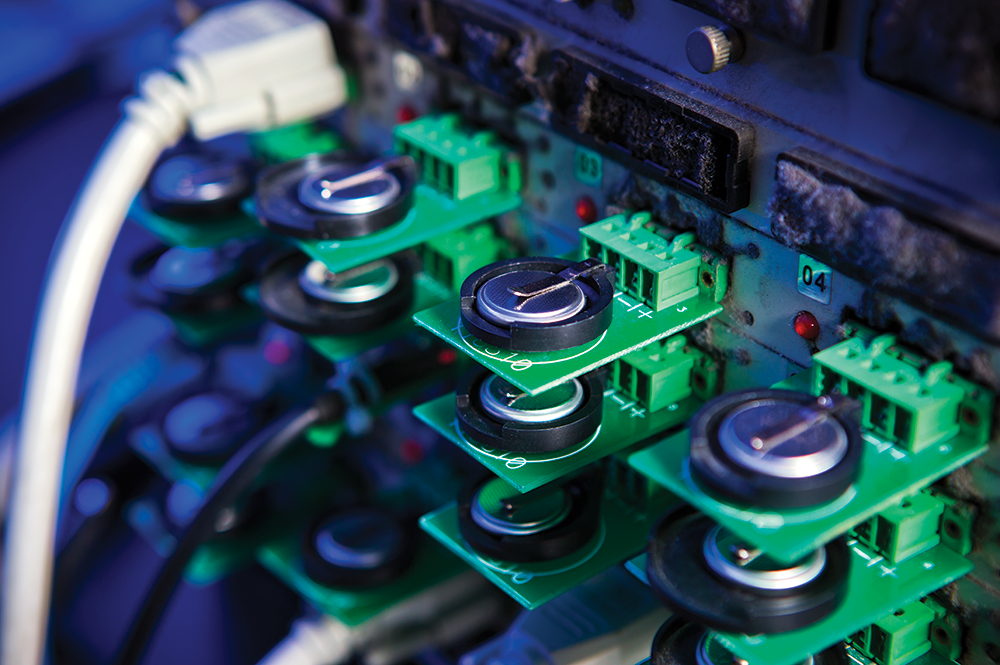Press Release
Solid-State Battery Experts Available
Members of the press are invited to connect with battery experts at UMD's A. James Clark School of Engineering.
MEDIA ADVISORY January 12, 2021
CONTACT:
Melissa L. Andreychek
(301) 405-0292
mandreyc@umd.edu

College Park, Md. — The lithium-ion batteries that power today’s cell phones, laptops, and electric vehicles can trigger fires and, in some cases, explosions (as shown by numerous consumer electronic battery fires and the temporary grounding of a Boeing 787 fleet for a series of battery fires, for example) due to their use of a flammable liquid electrolyte.
Solid-state batteries replace this flammable liquid electrolyte with a non-flammable solid electrolyte, and are considered a step change in energy storage—not only because of their tremendous increase in safety, but also because of their potential for much greater energy density (i.e., longer electric vehicle range) at lower cost.
Engineers at the University of Maryland (UMD) have made numerous transformational advancements towards solid-state batteries that are at once dramatically safer, potentially cheaper than conventional batteries—and with double the energy density.
Members of the media are invited to connect with battery experts at UMD’s A. James Clark School of Engineering through two ways:
- By contacting directly leading battery experts at UMD.
- By attending the virtual winter meeting of UMD’s Center for Research in Extreme Batteries on January 15.
Details for each are provided below.
If you need assistance locating additional experts, contact Melissa L. Andreychek, assistant director of communications, at mandreyc@umd.edu.
Eric Wachsman, Ph.D., ewach@umd.edu
Professor and William L. Crentz Centennial Chair in Energy Research, Departments of Materials Science & Engineering and Chemical & Biomolecular Engineering
Director, Maryland Energy Innovation Institute
Founder and Executive Director, Ion Storage Systems
Wachsman leads a major solid-state battery research effort at the University of Maryland, with multiple Department of Energy ARPA-E and Vehicle Technology Office and NASA awards totaling over $14 million. Ion Storage Systems is commercializing the solid-state battery technology developed by Wachsman and was recently named by Maryland Gov. Larry Hogan to Maryland's Future 20, a list of innovative startups from various industries that have the potential to be the state’s next major business success story.
In addition, Wachsman, along with Chunsheng Wang (Professor and R.F. & F.R. Wright Distinguished Chair) lead a $7.2 million U.S. Army Research Laboratory program to develop batteries for extreme needs of the department of defense with a major focus on solid-state batteries.
The Maryland Energy Innovation Institute, directed by Wachsman, leads the U.S. side of a $18.4 million program, awarded by the U.S.-Israel Energy Center and managed by the Binational Industrial Research and Development (BIRD) Foundation, to accelerate research and development of solid-state batteries.
Chunsheng Wang, Ph.D., cswang@umd.edu
Professor and R.F. & F.R. Wright Distinguished Chair, Departments of Chemical & Biomolecular Engineering and Chemistry & Biochemistry
Affiliated Faculty, Maryland Energy Innovation Institute
Director, Center for Research in Extreme Batteries
Wang has been cited by Research Interfaces as a top battery researcher and by Clarivate as a highly cited researcher for his work in next-generation batteries. He leads multiple Department of Energy ARPA-E and Vehicle Technology Office and Department of Defense awards totaling over $15 million.
The Center for Research in Extreme Batteries (CREB), a joint battery center between Army Research Laboratory (ARL) and UMD, directed by Wang, aims to foster and accelerate collaborative research on battery materials and technologies for extreme performance, environments, and applications. The consortium includes the Army Research Laboratory (ARL), National Institute of Standards and Technology (NIST), New York Battery and Energy Storage Technology Consortium, and Argonne National Laboratory.
In addition, Wang, along with Eric Wachsman (Professor and William L. Crentz Centennial Chair) lead a $7.2 million U.S. Army Research Laboratory program to develop batteries for extreme needs of the department of defense with a major focus on solid-state batteries.
Paul Albertus, Ph.D., albertus@umd.edu
Assistant Professor, Department of Chemical & Biomolecular Engineering
Associate Director, Maryland Energy Innovation Institute
Albertus is a former Program Director for the U.S. Department of Energy’s Advanced Research Projects Agency-Energy (ARPA-E), where he led the initiation of about $100 million of funding towards new research projects, most of them electrochemical technologies. In particular, he led the creation and management of the Integration and Optimization of Novel Ion Conducting Solids (IONICS) program and numerous additional projects focused on solid-state batteries.
The Maryland Energy Innovation Institute, for which Albertus is Associate Director, leads the U.S. side of a $18.4 million program, awarded by the U.S.-Israel Energy Center and managed by the Binational Industrial Research and Development (BIRD) Foundation, to accelerate research and development of solid-state batteries. Albertus is the Principal Investigator (PI) of this effort, which is titled the U.S.-Israel Solid Energy Consortium (UISEC).
Albertus’s research group focuses on mathematical modeling, experimental characterization, and innovations for electrochemical technologies, including lithium metal and solid-state batteries.
Center for Research in Extreme Batteries: Winter Meeting
Friday, January 15 | 1:00–5:00 p.m. Eastern Time
The Center for Research in Extreme Batteries (CREB) aims to foster and accelerate collaborative research in advanced batteries for extreme performance, environments, and applications (e.g., defense, space, biomedical applications). The virtual winter meeting will bring together some of the nation’s top researchers and developers in the battery industry; a full agenda can be found here.
Speakers include:
- U.S. Senator Chris Van Hollen of Maryland
- U.S. Senator Steve Daines of Montana
- Dr. Ashley Ruth, a chemical engineer in the Tactical Power Branch/Power Division at the U.S. Army Combat Capabilities Development Command (DEVCOM) Command, Control, Communications, Computers, Intelligence, Surveillance and Reconnaissance (C5ISR) Center
- Dr. Khalil Amine, a materials scientist at the Department of Energy Argonne National Laboratory
- Dr. Daphne Fuentevilla, a staff specialist for Energy & Power/Ground & Sea Platforms, Platforms & Weapons Directorate at the Naval Surface Weapons Center, Carderock Division
Please contact Melissa L. Andreychek, assistant director of communications, at mandreyc@umd.edu if you are a member of the media interested in attending.
Follow us online:
eng.umd.edu | Instagram | Facebook | Twitter | YouTube